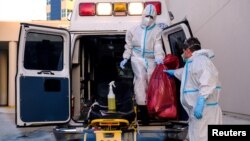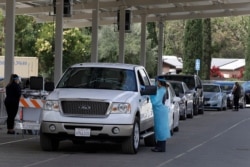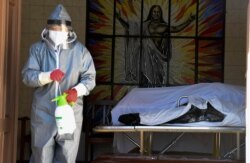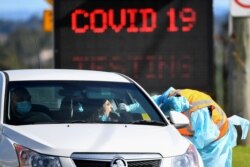As coronavirus infections in the U.S. surged past 4 million, hundreds of thousands more American workers sought unemployment aid, as Congress debates another rescue package.
Johns Hopkins University reported more than 4,034,057 confirmed U.S. COVID-19 cases Thursday – more than one-quarter of the 15.3 million cases worldwide. The U.S. also remains the world leader in COVID-19 deaths with nearly 144,223, far more than the 84,082 deaths in second-ranked Brazil, which has 2,287,475 cases.
As the surge in new coronavirus infections forced many businesses to close or cut back, there was also a sharp spike in the number of U.S. workers who applied for jobless benefits last week. The U.S. Labor Department reported Thursday that some 1.4 million workers adversely affected by a variety of lockdown measures filed for unemployment benefits, ending 15 consecutive weeks of declines in new filings.
The unemployment figures were released as Senate Majority Leader Mitch McConnell prepared to unveil a $1 trillion COVID-19 rescue package. The Democratic-led House passed a $3.5 trillion rescue bill more than two months ago and is calling for much more funding to assist state and local governments staggering under pandemic-related shortfalls as tax and fee revenues fall.
The Republican-led Senate insists on limiting the funding to about $1 trillion and using that funding on new legal protections for schools, businesses and charities that are set on reopening.
President Donald Trump wants $105 billion in education funding in the next COVID relief bill, saying he wants schools to have the money as an incentive to reopen in the fall and for families to have school choice.
Nearly every public and private school has been closed since March and students have been learning remotely.
“I would like to see the schools open – open 100 percent. And we’ll do it safely, we’ll do it carefully,” Trump said Thursday at the daily coronavirus briefing. Scientists and educators continue to debate the safety of reopening schools.
The United Nations Development Program released a report Thursday recommending that nearly 3 billion of the world’s most impoverished people get a temporary income to help contain the spread of the coronavirus.
The report said $199 billion per month would give 2.7 billion people living below or just above the poverty line in 132 developing countries a basic income and the “means to buy food and pay for health and education expenses.”
In Australia, a mandatory face mask order officially took effect Thursday in the country’s second-largest city, Melbourne, which has become the epicenter of the country’s rising number of novel coronavirus cases.
The mandate is the latest order imposed on Melbourne’s 5 million residents in an attempt to control the spike in COVID-19 infections. Anyone over the age of 12 caught in public without any kind of face mask or covering could be fined up to $143, while employers who discourage their workers from wearing a mask face a potential fine of more than $7,000.
Premier David Andrews of Victoria state, of which Melbourne is the capital, said the face mask mandate was imposed due to the increase of confirmed COVID-19 infections, and a refusal by residents who tested positive for the virus to isolate themselves.
On Thursday, Australia had 423 new cases, 403 of them in Victoria, which posted a single-day record of 484 new COVID-19 cases the day before. The city is in the second week of a six-week lockdown that bans all residents from leaving home unless going to work, school, medical appointments or food shopping.
Kenneth Schwartz, Wayne Lee, Richard Green, Mia Bush contributed to this story.








